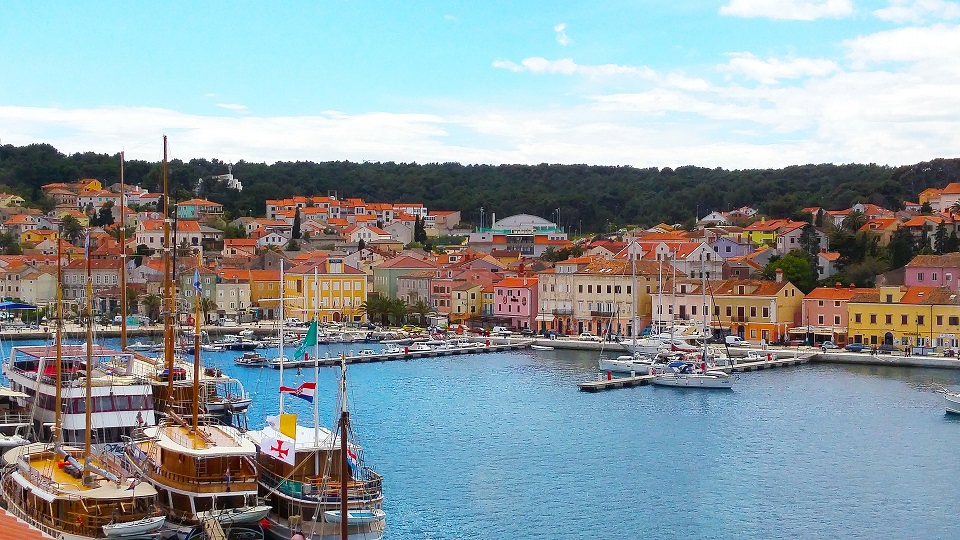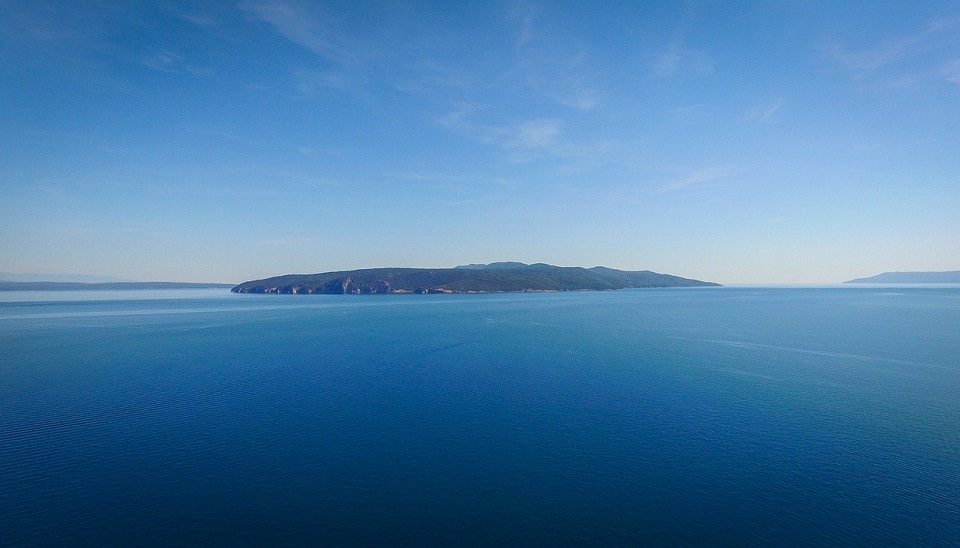Croatia Kvarner Region Tourist Traffic Up 50 Percent in 10 Years
Kvarner's tourist traffic numbers continue their upward trajectory. The Kvarner region, located in Northwestern Croatia, finished 2019 with 3.1 million arrivals and 19.1 million overnight stays. Compared to 2018, there were 2% more arrivals and 1% more overnights. Overnights also increased by 3% compared to 2017, 13% compared to 2016 and 50% compared to 2010.
During peak season, overnight stays remained at last year's levels, with an average occupancy of 25 days, and 30 days at hotels. That means that there wasn't a lot of room for growth during the the busiest season of the year, according to MorskiHR on January 8, 2020. Therefore, it is important to emphasize that overnight more stays increased by 1% during pre-season, while the post-season overnight stays increased by 4%. The increase in overnights during pre and post-season is more significant when compared with results from 2010, and it shows that overnights during these times of the year increased by 90%, according to the tourist board.
Germany Traditionally Strongest Market
In 2019, 630,000 German guests visited the Kvarner region, resulting in almost 4.7 million overnight stays. This figure has certainly been influenced by the large number of promotions directed toward the German market. In addition to Germany, three more markets have reached more than one million overnights: Slovenia (3 million), Austria (1.8 million) and Italy (1.3 million). The share of foreign traffic for these four countries is nearly 70%.
Kvarner’s inclusion on group tour routes which take guests from distant markets to Europe has also resulted in a large increase in traffic from these markets. In the last 3 years, guests from China have almost tripled their number of overnight stays while US citizens have increased their overnights by 50%.
Guests from the United Kingdom are also worth mentioning. They spent 137,000 overnights in Kvarner which is 25% increase from 2018, and 44% increase from 2016! Foreign tourists account for 85% of overnight stays and domestic tourists 15% (3 million nights, an increase of 5%).

Mali Lošinj
Most Guest Overnights on Island of Krk
Among the subregions, the island of Krk is in the lead, with an increase of 1% and 7 million overnights (and has a 36% share of total overnights in Kvarner).
The Crikvenica-Vinodol Riviera ranks second (3.2 million) followed by the island of Losinj (2.4 million). The number of overnight stays continues as follows: the Opatija Riviera and the island of Rab (2.2 million), the island of Cres (1.1 million), the Rijeka area (925,000) and Gorski Kotar (110,000). The highest percentage increase in overnight stays (14%) was recorded in the Rijeka area.
Mali Losinj (2.4 million nights) and Crikvenica (2.2 million nights) are among the "best" destinations.
Guests Prefer Croatia Family Accommodations
Family accommodations accounted for 40% of recorded overnight stays (7.7 million). Campsites and hotels recorded almost the same number of total overnights: 3.7 million each with individual shares of 19%.
The highest increase in overnights was recorded in upper-category accommodations:
- Hotels generally realized 1% more overnights. However, 4 and 5-star hotels enjoyed a 6% increase.
- All family accommodations experienced a 1% increase in overnight stays, but 5-star family accommodations enjoyed a 38% increase!
- A similar scenario applies to campsites: there was an overall 1% decrease in overnight stays, but overnights at 5-star camps are up 22%.
Regardless of the type, 5-star facilities have seen 15% increase in overnight stays during the past year and 70% increase overnight over the last 3 years!

Cres
Nautical Tourism Overnights Up Thirty-Two Percent
These figures do not include 24,500 arrivals and 156,000 overnight stays due to nautical traffic, which in has increased by as much as 32% the last year alone. There are about 20 nautical tourism ports in Kvarner, and Marina Punat alone accounts for more than half of nautical overnights.
Kvarner Third to Istria and Split-Dalmatia in Accommodation Capacity
As of 2019, there are 190,000 permanent beds available for tourists in Kvarner which represent a 17% share in accommodation capacity within Croatia. The Kvarner region ranks third in terms of total available accommodation, which is behind Istria and Split-Dalmatia counties in Croatia.
Irena Peršić Živadinov, Director of the Kvarner Tourist Board, emphasizes that the primary goal is to strengthen the pre and post-seasons, because one cannot always count on a record “peak” season.
Kvarner Tourist Board Expects Long-Term Increase
“In recent years, the Kvarner region has definitely succeeded in strengthening the pre and post-seasons. Compared 2010 to 2019, we have seen a huge increase in overnight stays during both seasons - almost 90%! Over the past 10 years, we have invested in the quantity and quality of the regions’ offerings. We have also focused on joint branding and activities and recognized our strengths regarding products and offerings."
“These steps probably won’t yield immediate results but will take a longer time to have an effect. Taking that into consideration, for example, 12.7 million overnight stays were recorded in 2010, it is clear that in a period of 9 years we have realized 6.3 million more overnights, or the total number of overnights in Kvarner ha increased by almost 50%,” Peršić Živadinov points out.
Follow our Travel page to keep up-to-date on tourism trends in Croatia.
"Vino i Vruja" Event to be Held in Ika near Opatija
Ika is a small fisherman's village, located near Opatija, and for the last five years, it has hosted the unique event called "Vino i Vruja" (Wine and the Underwater Wellspring; you have to admit it has a nicer ring in Croatian).
A group of enthusiasts gathered together in the Ikarski barkajoli association, supported by the City of Opatija and the local tourist board, and each year, they put a selection of the best Croatian wines in the underwater wellsprings of Ika, where they are given a year in the perfect conditions to age. This Saturday, last year's batch will be taken out and tasted.
The underwater wellsprings of Ika are a geological phenomenon, where freshwater from deep within the karst comes out into the sea. It is supposed that some of the water arrives here all the way from the Alps. After particularly rainy days, the wellsprings "activate" and the seabed of the bay becomes disturbed by the strong flow of freshwater. That freshwater is, of course, rather cold, and it makes the seawater in the bay to become much less salty, which is something a lot of fish appreciate. And, of course, the cold water makes it a perfect "cellar" for the wines to age in.
Last year, 4,000 bottles of wines were placed there, by winemakers such as Miklaužić, Kabola, Prelac, Bruno and Giulio Ferenac, Fuhtar, Pavlomir winery and Iločki podrumi (Ilok cellars). This Saturday, August 3rd, seven cages with around 3,000 bottles will be brought up to the surface; the wines by Iločki podrumi (cellars) will, however, be left at the bottom for another year, as per their request. At the same time, the new cages will be sent down, and this year's vintage will include wines by the Rossi winery in Istria.
The most attractive part of the event, the actual "taking wine out and putting more wine in" part will start at around 10:00, and the divers participating are from the Opatija fire brigade, as well as some local diving volunteers. In the evening, after 19:00, a tasting of the wines that spent a year underwater will be held, as well as the tasting of other wines by these winemakers. The organisers promise that some grilled fish will also be offered to those attending the tasting.
On the second day of the "Vino i vruja" event, Sunday, August 4th, a regatta of traditional fishing boats will be held in the evening.
The Opatija Riviera, Villas, Hotels, and Luxury German Yachts
Opatija is a beautiful Croatian coastal town in the Kvarner region, and it also has an interesting history. The owners of nineteen of Opatija's stunning hotels and villas also have their story to tell, and it begins in Germany.
As Novac/Frenki Lausic writes on the 22nd of July, 2019, it was June the 27th, 1875, when Friedrich Lürssen, then 24 years old, first opened a workshop in Aumund near Bremen, where he built rowing boats.
He specialised in racing boats, and his clientele was made up of Bremen rowers, but as his product was extremely aerodynamic, made of very lightweight materials, orders from the entire German empire began to arrive shortly, and the need for expansion began. Only eleven years after Friedrich, at the request of Gottlieb Daimler, an innovator who was a pioneer of internal combustion engines, a six-metre model called Lürssen REMS, the first motor boat in the world, was built.
Somewhere a little further south in what was then the Austro-Hungarian Empire, in the coastal town of Opatija, a hotel had existed for two years up until that point. It was called Kvarner and boasted the best coffee on the whle of the Adriatic. Eight years later, the emperors of Austro-Hungary and the German Empire, Francis Josip I. and Viliam II, met right there in Opatija.
Today, 125 years later, the Germans have taken to Kvarner once again because Liburnia Riviera Hotels, the largest hotel chain in Opatija, consisting of nineteen hotels and villas in Opatija, Lovran, Mošćenička Draga and Medveja, are in the process of getting a new owner, Germany's Gitone Adriatic.
Behind the aforementioned company stands Lürssen Yachts, the world's most prestigious mega yacht manufacturer with eye-watering revenues of 8.3 billion eurps in 2018, owned by the Lürssen family whose history is permeated by the production of impressive boats, cooperation with the military, and recently with the cooperation with some of the richest people in the world who want boats with the Lürssen name on them.
This family's path began at the beginning of the twentieth century when Lürssen began expanding onto the market of high-speed boats, and Friedrich's son Otto, who became a partner, designed the Donnerwetter, a craft that reaches a speed of 35 knots.
Their Lürssen-Daimler, with a 102 horsepower engine, became the unofficial world champion in speed in 1911, and just one year later, the Saurer-Lürssen model won the same title. After the outbreak of the First World War, the Lürssen family's factories, which were constantly expanding, caught the eye of the German military. Collaboration with the German Army culminated in World War II, where their fast patrol boats were equipped with torpedoes.
After the war came to an end, in 1948, the company marked the beginning of a new era with two brothers, the grandsons of the company's founder Friedrich, who took over the company with their mother.
Friedrich had passed away in 1916. Through a new generation of his family, the company continued to build patrol boats through military contracts, presenting a new class called Jaguar in 1957. One of the key years for the company was 1979, when the Burmester Werft shipyard took over, expanding its product range to yachts, sailing boats and other special purpose vessels.
Today, Lürssen is one of the leading small German shipyards led by four generations of the same family for more than 140 years, currently Peter and Friedrich Lürssen are at the helm. They continue to dominate the market of military ships, desert, patrol and rocket corps, have a separate company in Australia, and have equally successfully developed their production for the "civilian" market that started to conquer that world back in the eighties.
Namely, their brand Lürssen Yachts, is now the world's leading manufacturer of super-tailored custom mega-yachts such as the Octopus, built for Paul Allen, one of the founders of Microsoft, the Rising Star built for David Geffen, the Pelarus once sailed by Roman Abramovich, and Azzam, the world's largest private yacht which is 180 metres long, and was built in 2013, ordered by Khalifa bin Zayed bin Sultan Al Nahyan of the United Arab Emirates, worth about 150 billion US dollars.
Lürssen Yachts are famous for their brilliant design and superb quality, and represent a status symbol among the world's billionaires.
The family recently moved its portfolio to the hotel business, in Vienna, Austria, and Opatija's LRH is their first acquisition here in Croatia.
Darko Ostoja, co-owner of the current LRH shareholder package, has revealed to the media that new owners have recently started investing in tourism in Austria and Germany, intending to diversify their owner portfolio.
Ostoja points out that the future owners have much stronger potential for investing in LRH than the owners so far have had, and believes it will have a certain impact on the entire destination as well. However, in conversation with Jutarnji list, he said that his side would be reluctant to talk about what moves are to be made, as the ownership transaction is yet to be realised.
A blessing also needs to be given by the Agency for the Protection of Market Competition, which is highly unlikely to be an issue. The Gitone Adriatic company was founded at the beginning of this month, and according to data from the court register, its basic activities are related to the provision of services, primarily those in tourism.
Make sure to follow our dedicated lifestyle and business pages for much more.
Kvarner Gourmet: Opatija's Thirteenth Chocolate Festival

Is This Croatia's Best New Beach?
Lido beach in Opatija welcomes its first guests over the weekend.


